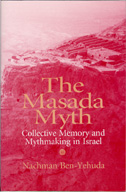|
The Masada Myth
Collective Memory and Mythmaking in Israel
Nachman Ben-Yehuda
"The Masada Myth is both a scholarly and a passionate book, analyzing with great clarity the relationship between deviance and mythology. The careful descriptions and provocative ideas will create new controversy, one that is timely and important for our understanding of what has become the new world dis-order." —Pat Lauderdale, Stanford University
In 73 A.D., legend has it, 960 Jewish rebels under siege in the ancient desert fortress of Masada committed suicide rather than surrender to a Roman legion. Recorded in only one historical source, the story of Masada was obscure for centuries. In The Masada Myth, Israeli sociologist Nachman Ben-Yehuda tracks the process by which Masada became an ideological symbol for the State of Israel, the dramatic subject of movies and miniseries, a shrine venerated by generations of Zionists and Israeli soldiers, and the most profitable tourist attraction in modern Israel.
Ben-Yehuda describes how, after nearly 1800 years, the long, complex, and unsubstantiated narrative of Josephus Flavius was edited and augmented in the twentieth century to form a simple and powerful myth of heroism. He looks at the ways this new mythical narrative of Masada was created, promoted, and maintained by pre-state Jewish underground organizations, the Israeli army, archaeological teams, mass media, youth movements, textbooks, the tourist industry, and the arts. He discusses the various organizations and movements that created "the Masada experience" (usually a ritual trek through the Judean desert followed by a climb to the fortress and a dramatic reading of the Masada story), and how it changed over decades from a Zionist pilgrimage to a tourist destination.
Placing the story in a larger historical, sociological, and psychological context, Ben-Yehuda draws upon theories of collective memory and mythmaking to analyze Masada's crucial role in the nation-building process of modern Israel and the formation of a new Jewish identity. An expert on deviance and social control, Ben-Yehuda looks in particular at how and why a military failure and an enigmatic, troubling case of mass suicide (in conflict with Judaism's teachings) were reconstructed and fabricated as a heroic tale.
Nachman Ben-Yehuda is professor of sociology at Hebrew University in Jerusalem. He is the author of Deviance and Moral Boundaries, The Politics and Morality of Deviance, Political Assassinations by Jews, and (with Erich Goode) Moral Panics.
Media & bookseller inquiries regarding review copies, events, and interviews can be directed to the publicity department at publicity@uwpress.wisc.edu or (608) 263-0734. (If you want to examine a book for possible course use, please see our Course Books page. If you want to examine a book for possible rights licensing, please see Rights & Permissions.) |
|

January 1995
LC: 95-013543 DS
424 pp. 6 x 9
13 b/w photos

|
Cloth $40.00 s
ISBN 978-0-299-14830-0
Paper $17.95 x
ISBN 978-0-299-14834-8 |
 |
ADD TO CART |
| |

 |
| |
|
| |
|
